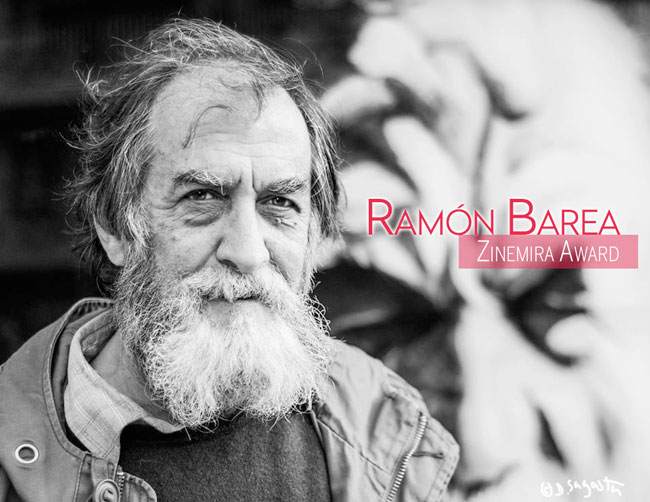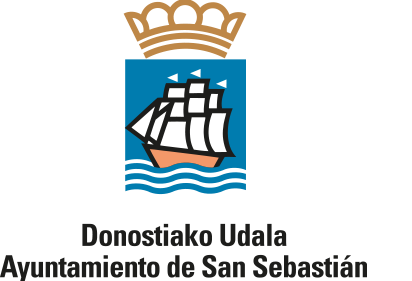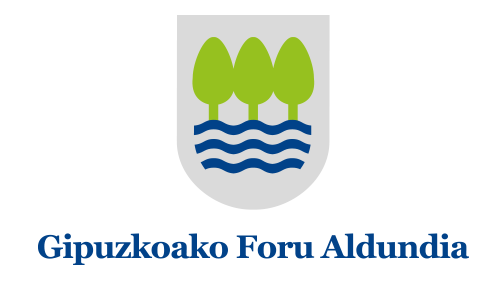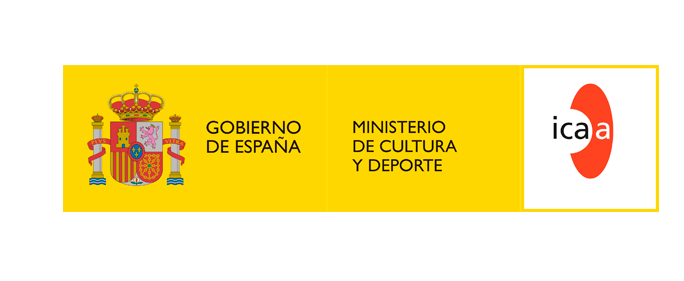Follows us

|
|

Friday, August 26th, 2016
|
|
Zinemira will present more Basque productions than ever
The section will include seventeen films produced in the Basque Country, nine of which will compete for the Irizar Basque Film Award
Ramón Barea will receive the Zinemira Award at the Basque Film and ETB Gala, setting for the premieres of ''Igelak (Frogs)'' and ''Agirre Lehendakaria''
|
|
|
The Zinemira section will include more Basque productions than ever at the 64th edition of the San Sebastian Festival. Seventeen productions will compose the overview of Basque cinema, eight of which will compete for the Irizar Basque Film Award.
The competing titles include eight documentaries and a single feature film, Igelak (Frogs), directed by Patxo Telleria. The film, to be screened at the Basque Film and ETB Gala, follows a corrupt banker on the run. This is the third time that the actor, screenwriter and filmmaker from Bilbao has premiered a film at San Sebastian after having written and directed with Aitor Mazo La máquina de pintar nubes (The Cloud-Painting Machine, 2009), winner of the Versión Española Best Screenplay Award, and Bypass, in 2012, Best Film Comedy Award at Michigan. The gala will also see the premiere of Agirre Lehendakaria, a documentary biography directed by Francesc Escribano looking at the personal and professional life of Basque President José Antonio Aguirre through the research work of actor Daniel Grao as he prepares for his performance of this historic character.
Films about history, distant or recent, art and music inspire the documentaries in the section. Chillida: esku huts is the atypical biography of the sculptor from San Sebastian, directed by Juan Barrero, author of La jungla interior (2013); and the filmmaker Juanma Bajo Ulloa (Vitoria-Gasteiz, 1967) , winner of the Golden Shell with his debut movie, Alas de mariposa (Butterfly Wings), brings us in Rocknrollers an encyclopaedic reflection on the world of rock ‘n’ roll based on the Azkena Rock Festival.
Maider Oleaga (Bilbao, 1976), author of Amaren idea and participant in the first edition of the Ikusmira Berriak programme, pens one of the five pieces of the project about the Basque President José Antonio Aguirre, promoted by the Basque TV and Radio network, ETB. Berlin, hideout of Aguirre in 1941, welcomes five people who wander its streets in Iragan Gunea Berlin. In Quinta Planta (Fifth Plant), another part of the project on the subject of President Aguirre, Mikel Rueda portrays Jon, a young idealist in the New York of the 60s. For its part, El fin de ETA (ETA, The End) is the documentary on the process that led to the end of ETA’s violence, narrated by Justin Webster, former reporter with The Independent and author of documentaries including Gabo, Seré asesinado and Barça Confidential.
Three debutants complete the competitive section. Baskavigin. La matanza de los balleneros vascos (Baskavigin.The Slaying of the Basque Whalers) is the first documentary by Aitor Aspe, author of the shorts Last Smile and Mi lucha. The production takes us back to June 1615 to recreate a violent occurrence in Iceland’s history and to remember its victims, 86 Basque whalers.
The moviemaker from Eibar now living in Copenhagen, Juan Palacios (Eibar, 1986) makes his feature directorial debut with Pedaló, narration of a journey by three friends aboard a pedalo round the Basque coast, and the parallel voyage of its director. And GUtik ZUra is the first audiovisual work by Mari Jose Barriola, a Technical Agricultural Engineer, expert in wood, who takes a trip from ancient times until today through the relationship between this material, the forest and the human being.
Diversity is also present in the non-competing films. From Acantilado (The Cliff), the latest feature by Helena Taberna, about two siblings and a sect in the Canary Islands, to the documentary Pelota II, by the anthropologist Olatz González Abrisqueta and the Danish poet and filmmaker Jørgen Leth, looking at the relationship between the pelota player and his work instrument, passing through Mara Mara, a blizzard in the Pyrenees filmed by David Aguilar, who presented his previous work Nao Yik (2011) in Zinemira. Conflicts and external catastrophes figure in Oihalak adarretan, where Juanmi Gutiérrez turns the eyes of his documentary towards ten million Armenians; Nola?, in which Fermin Muguruza, musician and maker of documentaries such as Checkpoint Rock, portrays the situation in New Orleans ten years on from hurricane Katrina; and Skhvisi Sakhli / House of Others, the Georgian, Russian and Spanish co-production directed by Rusudan Glurijdze (Tbilisi, Georgia, 1972), telling the tale of two families after the war in Abkhazia who are assigned houses left empty by the losers.
And there’s also space for a nod towards the pioneers of our recent past. Gaur irekiko ditut ateak, by Eriz Zapirain (Gazta zati bat), recovers the adventure of the creation of “Egunkaria”, first daily newspaper in the Basque language, closed down by the Spanish High Court in 2003. Finally, Iratxe Fresneda, Professor of Audiovisual Communication at the University of the Basque Country, takes a detailed look in her first film, Irrintziaren oiartzunak (Echoing Calls), at the work of filmmaker Mirentxu Loyarte, author of Irrintzi, a daring cinematic exercise in 1978.
ZABALTEGI-TABAKALERA
|
|
|
|
Caminan
/ On The Path
Short film
Mikel Rueda
(Spain)
A road in the middle of nowhere. A car. A bike. Two lonely people looking for the same thing. They meet. World premiere.
|
|
|
|
|
|
|
|
|
Gure hormek
/ Our Walls
Short film
María Elorza (Las chicas de Pasaik), Maider Fernandez Iriarte (Las chicas de Pasaik)
(Spain)
The neighbourhood of Housewives. The district of Insomniacs. The newsstand of the Unknown Mother. The underground of The Lonely Women. Our walls pay tribute to the people we love.
|
|
|
|
|
|
|
|
|
Sipo Phantasma
/ Ghost Ship
Koldo Almandoz
(Spain)
An hour-long cruise, the meta-filmic essay of a vampire moviemaker, a ghost film. The story of the search for a place gives rise to discoveries that lead to other searches. F.W. Murnau and his movie Nosferatu; the love triangle between Bram Stoker, his wife Florence Balcombe and his boyfriend Oscar Wilde. Famous shipwrecks, holidays on board a ship. The stolen bust from a grave, reflections on history and cinema. A tale of Russian dolls who conceal gothic fiction, documentary realism and video essay. Narrative collage with fragments of books, letters, reports, announcements, telegrams, press cuttings, film extracts, puppets. A mirror game with real and fictional vampires; loneliness, dehumanisation, social control. And in the middle of it all, the novel Dracula; its main character, its structure, its background. Premiere at Rotterdam Film Festival.
|
|
|
|
|
ZINEMIRA
Section dedicated to Basque film organised by the San Sebastian International Film Festival, the Basque Government Department of Culture and the Filmoteca Vasca; with the sponsorship of Irizar and EITB; and the collaboration of EPE/AVE and IBAIA.
Zinemira in competition: Irizar Basque Film Award
(world premieres)
|
|
|
Baskavígin. La matanza de los balleneros vascos
/ Baskavígin. The Slaying of the Basque Whalers
Aitor Aspe Fid
In June 1615, 86 Basque whalers, captained by Martín de Villafranca, Pedro de Aguirre and Esteban de Tellería sailed to the cold waters of Northern Iceland, where they were involved in the country’s darkest episode.
|
|
|
|
|
|
|
|
|
Chillida: Esku Huts
Juan Barrero
At the age of 19, Eduardo Chillida (1924-2002) was a highly gifted athlete well on his way to becoming a football legend. However, a brutal injury during a game put an end to his professional sports career. Nobody except Pilar Belzunce, his life-long partner, suspected that the young goalkeeper from Hernani was about to rewrite his future and die decades later as one of the 20th century’s best sculptors. Chillida: Esku Huts is not a conventional biography, but a poetic, intimate look at an artist second to none. A person who remains alive through his work, his eight children and some of his closest collaborators.
|
|
|
|
|
|
|
|
|
El fin de ETA
/ The Demise of ETA
Justin Webster
The documentary opens with conversations between the President of the Basque Socialist Party of the time, Jesús Eguiguren, and the leader of Batasuna, Arnaldo Otegi, at the Txillarre farmhouse in Elgoibar (Gipuzkoa), held from 2000 to 2004. They refer to the meetings between “Josu Ternera” and Eguiguren in Switzerland and to the different phases – for and against – that alternated in these conversations, with more journeys to Switzerland and Norway, while narrating the conversations with the nationalist left-wing, often with participation of the Basque Nationalist Party of Josu Jon Imaz and Iñigo Urkullu. The arrival to ETA of new military leadership with Francisco Javier López Peña, “Thierry”, representative of the organisation’s most radical branch, is on the point of undoing the progress achieved until then.
|
|
|
|
|
|
|
|
|
GUtik ZUra
Jon Maia Soria
The idiosyncrasy of the Basque Country is founded on the forest and wood. In this documentary we will travel from antiquity to the future, demonstrating the relationship between the person and wood. To do it, we will take the life experience of the people chosen and the opinion of renowned world specialists to show, by means of a multifaceted combination of history and stories, the principal keys of the forest and wood yesterday, today and tomorrow.
|
|
|
|
|
|
|
|
|
Igelak
/ Frogs
Patxo Telleria de la Fuente
Pello, a bank branch manager, is arrested for financial fraud. Abandoned by the superior who got him mixed up in the crime, he scarpers to avoid going to jail and becomes a fugitive. By chance he ends up hiding in a building occupied by battling evicted tenants. Pello earns the group’s trust with the intention of stealing enough cash from them to pay for false documents, move abroad and start a new life.
|
|
|
|
|
|
|
|
|
Berlin. Iragan gunea Berlin
Maider Oleaga
Iragan Gunea Berlin follows five people from different origins as they move anonymously around the streets of Berlin. Each of them with another life somewhere else, trying to ascertain where to go.
|
|
|
|
|
|
|
|
|
Pedaló
Juan Palacios
A fledgling filmmaker follows the steps of three friends on a surrealistic nautical voyage. Aboard a second-hand pedalo, they set out on a journey of 150 kms leaving from the Basque coast. The pedalo is not, however, made for the waters of the Cantabrian Sea, and no sooner has it started than the voyage spirals into madness: an accident, partying, a hangover, a shaman, a funeral… As he documents the expedition of the three “sailors”, the director sinks into a parallel voyage.
|
|
|
|
|
|
|
|
|
Nueva York. Quinta planta
Mikel Rueda
What pushes people to do what they do? For what strange reason do some people still decide, in an individualistic world such as this, to spend part or all of their time helping others? Through the different testimonies of various people, we will meet one of these rare birds. A person who spent part of his life helping others and who, unawares, began one of the greatest changes of our days.
|
|
|
|
|
|
|

© LAST TOUR
|
|
Rocknrollers
Juanma Bajo Ulloa
The yearly Azkena Rock Festival in Vitoria-Gasteiz serves as a gathering place for meditating on the passion for Rock ‘n’ Roll, its essence and extraordinary social reach.
|
|
|
|
|
Zinemira out of competition
|
|
|
Acantilado
/ The Cliff
Helena Taberna
Gabriel receives news of a mass suicide by a sect in the Canary Islands. His younger sister, from whom he has heard nothing for years, was one of its members. Travelling to the island, Gabriel is soon deeply involved in the search for his missing sibling.
|
|
|
|
|
|
|
|
|
Gaur irekiko ditu ateak
/ Opening Today
Eriz Zapirain
In 2003 the Spanish National High Court closed down the only existing newspaper in the Basque language: Egunkaria. It closed down the dailypaper and accused members of its editorial board of belonging to ETA. Seven years later is was proven during the trial that those accusations had no basis: all of the defendants were set free. This documentary doesn’t show that sad injustice, but the inspiring creation of the first newspaper in the Basque language, Euskera.
|
|
|
|
|
|
|

© Pimpi&Nella
|
|
Irrintziaren Oihartzunak
/ Echoing calls
Medium-length film
Iratxe Fresneda
Portrayal of the creative exile of Mirentxu Loyarte (Iruñea, 1938) one of those brave European film pioneers who live under the cloak of anonymity and who, despite the unfinished projects, has never stopped being a filmmaker.
|
|
|
|
|
|
|
|
|
Mara Mara
David Aguilar Iñigo
Death has been considered and lived in many ways throughout human history. We could say that ours is just like any other, but also that it is so special and different that it breaks away from the relative coherence assigned to it in the past. In Basque, Mara Mara means the sound of snow hitting the ground. Light and darkness pierce this film made during a blizzard in the Pyrenees.
|
|
|
|
|
|
|
|
|
Nola?
Fermin Muguruza Ugarte
Attracted by its charm, Fermin Muguruza went to The Big Easy to record “Irun Meets New Orleans”, where he adapted to the sounds of New Orleans eight songs from his career, interpreted two of the city’s classics, and made a documentary, Nola? about the situation ten years on from hurricane Katrina. All filmed with the crème de la crème of the local scene: from the historic Preservation Hall Jazz Band to bounce rapper Katey Red, with collaborators from Galactic, Dr. John and Trombone Shorty.
|
|
|
|
|
|
|
|
|
Oihalak adarretan
Juanmi Gutiérrez Márquez
There are 10 million Armenians in the world. Of these, 3 million live within what are today the borders of Armenia, independent republic. The remaining 7 million are spread over several countries. They form the so-called Armenian diaspora. All of them, inside and outside of the country, share a single sentiment, almost holy, towards an Armenia which is at the same time splendid and sorrowful.
|
|
|
|
|
|
|
|
|
Pelota II
Jørgen Leth, Olatz González Abrisketa
Documentary on the Basque sport of hand-pelota focussed on the fateful relationship of the pelotari with the pelota ball. Following the players’ obsessive quest to find the perfect ball every game, the film penetrates a country whose modernity has detracted nothing from its existential passion.
|
|
|
|
|
|
|
|
|
Skhvisi sakhli / House of Others
Rusudan Glurjidze
Georgia, the 90s. Two families have physically survived a short but devastating war in the Autonomous Republic of Abkhazia. Being on the winning side, they are assigned the houses left empty by the losers. But they prove unable to build a new life in peace.
|
|
|
|
|
Zinemira Kimuak
(for professionals and accredited guests only)
The section will also include the selection of shorts in the Kimuak 2016 programme, an initiative of the Basque Government Department of Culture and Euskadiko Filmategia-Filmoteca Vasca with the objective of lending visibility to the best Basque shorts of the year. This year’s Kimuak selection includes seven short films.
|
|
|
Beti bezperako koplak
Short film
Ageda Kopla Taldea , Bego Vicario , Ibon Markaida , Kote Camacho , Arrate López Apellániz , Izibene Oñederra , Mariñe Arbeo , Oihana Leunda , Aitor Oñederra , Ximon Agirre , Jon Zurimendi , Xara Agirre , Irantzu Yaldebere , Andere Molinuevo , Iosune Etxarte , Malen Amenabar , Naiara Zuria Mauleón , Zaloa Ipiña , Alots Arregi , Roberto Zabarte , Jon Munarr
Making the most of the celebrations on the Eve of St. Agatha -a Basque tradition where groups of people, accompanied by improvisers of Basque verse (bertsolaris), go round the houses in a festive atmosphere singing verses to the beat of their walking sticks- the bertsolari Maialen Lujanbio strongly condemns gender-based violence. Verse after verse, she denounces the different kinds of male violence, and our impossibility to overcome it. Taking the occasion as their excuse, twenty young Basque artists draw on different animation techniques to helm a collective creation.
|
|
|
|
|
|
|
|
|
Caminan
/ On The Path
Short film
Mikel Rueda
A road in the middle of nowhere. A car. A bicycle. Two lonely people looking for the same thing. They meet.
|
|
|
|
|
|
|
|
|
False flag
Short film
Asier Urbieta
Adem Lethani has been tortured and tied up in an abandoned garage. He’s trying to cut through the ropes round his wrists when a SUV comes into the garage and the light goes on.
|
|
|
|
|
|
|
|
|
Gure hormek
/ Our Walls
Short film
Maria Elorza, Maider Fernandez Iriarte
The neighbourhood of Housewives. The district of Insomniacs. The newsstand of the Unknown Mother. The underground of The Lonely Women. Our walls pay tribute to the people we love.
|
|
|
|
|
|
|
|
|
Hileta
Short film
Kepa Sojo
In a Basque village, in 1925, a vigil is underway for the young Inge, wife of Mikel Martikorena, who died suddenly. Visited by the village authorities, Martin, the family patriarch, has only one concern: the absence of his middle son Joanes, who has lost his mind after studying theology and wanders the hills preaching the resurrection of the dead.
|
|
|
|
|
|
|
|
|
Ihesa
Short film
Alejandro Díaz Castaño
When Maitane tells her husband Iosu that they have a water leak from the upstairs flat, he decides to go up and talk to the neighbours. But the visit will have more than one surprise in store for him!
|
|
|
|
|
|
|
|
|
Renovable
Short film
Jon Garaño, Jose Mari Goenaga
Years after they break up, Tania and Josean run into one another at a congress on renewable energies. She’s got plenty to say to him…
|
|
|
ZINEMIRA AWARD

Actor and filmmaker Ramón Barea will receive this year’s Zinemira Award presented by the San Sebastian Festival together with the producers associations EPE/APV and IBAIA to the career of an outstanding Basque cinema personality. The Zinemira Award will be presented during the Basque Film Gala / ETB Gala on September 20th at the Victoria Eugenia Theatre, prior to the premiere of the documentary Agirre lehendakaria and the full-length feature, Igelak.
Ramón Barea was born in Bilbao in 1949. Self-taught (but he’d rather have had teachers), he was an altar boy in his parish church, kettledrum player, and dog matador in Bilbao’s Plaza Nueva. Having had a passion for acting from a very young age, in the seventies he joined the Cómicos de la Legua and Karraka, two independent theatre groups in the Basque Country, of which he was the founder and actor. Before dedicating himself full-time to the world of show business at the age of 24, he was an employee, civil servant and student of Educational Sciences. In addition to his work on stage, Barea is a fine playwright and theatre director.
Highlights of this period are shows including the musical Bilbao Bilbao, Oficio de Tinieblas 5 based on texts by Camilo José Cela, Okupado, Euskadifrenia, Ubú Emperatriz, La Palanca Gran Cabaret, Hoy última función, The Man Who Mistook His Wife For a Hat, Orquesta de señoritas and so on up to almost a hundred.
His latest theatre works are the monologue On the Harmful Effects of Tobacco by A. Chekhov, his performance as Max Estrella in Luces de Bohemia with the company Ur Teatro, as Prospero in Shakespeare’s Tempest and as Menenius in Coriolanus, both directed by Helena Pimenta, and as Don Quixote in Morir cuerdo y vivir loco, written and directed by Fernando Fernán Gómez for the National Drama Centre and the Aragón Drama Centre. He also participated in El chico de la última fila and Cartas de amor a Stalin by Juan Mayorga, once again with the company Ur.
Outstanding among his theatre works are Jerónimo López Mozo’s Puerta del Sol, directed by Juan Carlos Perez de la Fuente, where he plays Benito Pérez Galdós, and Beaumarchais by Sacha Gitry in the version by Josep Maria Flotats, where he embodies Louis XV. He was also Focas the tyrant in Calderón’s En la vida todo es verdad y mentira with the National Classical Theatre Company under the orders of Ernesto Caballero. Under the latter he also played the part of Montenegro in Las Comedias Bárbaras.
As a theatre director his latest works are The Man Who Mistook His Wife For a Hat, based on the essay by neurologist Oliver Sacks, and The Dice Man by Luke Rhinehart, for which he also created the playwriting. He similarly directed El buscón for Templanza Producciones, Howard Zinn’s Emma for the Arriaga Theatre in Bilbao, a new run of the musical Bilbao, Bilbao, Ecografias by Karmele Jaio for Makiescénica, Escencia Patria for the Pabellón 6 Theatre Laboratory and Jean Anouilh’s Orquesta de Señoritas and Romeo and Juliet for the Pabellón 6 Youth Company.
One particular feature of his professional career is that he has never had, and still doesn’t have, a manager.
In films, he began his career in La fuga de Segovia with a whole generation of Basque actors and technicians in 1981, going on to participate nonstop in more than 100 films and around fifty shorts. These include Todo por la pasta (1991) by Enrique Urbizu; Blancanieves (2012) by Pablo Berger; La muerte de Mikel (1984); Adiós, pequeña (1986) and El rey pasmado (The Dumbfounded King, 1991) by Imanol Uribe, Muertos de risa (Dying of Laughter, 1999), La comunidad (Common Wealth, 2000) and 800 balas (800 Bullets, 2002) by Álex de la Iglesia; Silencio roto (Broken Silence, 2001) by Montxo Armendáriz; La madre muerta (The Dead Mother, 1993) by Juanma Bajo Ulloa; Cuando vuelvas a mi lado (1999) and Siete mesas de billar francés (Seven Billiard Tables, 2007) by Gracia Querejeta; Negociador (2014) by Borja Cobeaga; and Un otoño sin Berlín (An Autumn Without Berlin, 2015) by Lara Izagirre.
In television he has had parts in several of the most popular series of recent years, including: Compañeros, Periodistas, Aquí no hay quien viva, Hospital Central, Policías, en el corazón de la calle, Plan América or Acusados and mini-series such as Adolfo Suárez or Yo soy el solitario. For ETB he created the mise-en-scène for the programme Detrás del Sirimiri, also directing and coordinating the scripts of Flamingo Berria. He was also a member of the iconic Spanish TVE network programme El peor programa de la semana directed by Fernando and David Trueba.
As a film director he debuted in 1996 with the short film Adiós Toby, adiós, selected for the Critics’ Week at the Cannes Festival, to which he also took his second short, Muerto de amor. As a full-length filmmaker he debuted in 1999 with Pecata minuta, starring Elena Irureta and Mariví Bilbao. His next film at the helm, and his last to date, was El coche de pedales, in 2004, with Álex Angulo. He has also made documentaries on the performing arts and theatre work processes with the company Ur.
Among the numerous awards received over his career are particularly a Special Mention received at Huelva Latin America Film Festival for Enrique Gabriel’s En la puta calle (1997), and the award bestowed by the Festival du Cinéma Espagnol de Toulouse Midi-Pyrénées for El coche de pedales. In theatre he has been awarded the Bilbao Critics’ Ercilla Award five times for his different works as a director. He made it to Hollywood’s Academy Awards for his participation in the short by Borja Cobeaga, Éramos pocos.
His other accolades include the Basque Actors’ Union Award, the Max Performing Arts Award and the National Theatre Award.
|
Basque Film Gala / ETB gALA
|
|
|
Buscando a Agirre
Francesc Escribano Royo
Receiving the offer to play the part of Basque President Aguirre, actor Daniel Grao set about researching into the character. The documentary will accompany Grao on his voyage through the President’s personal and sentimental geography, with the objective of creating a human portrait of the Basque leader and being able to perform it.
|
|
|
|
|
|
|
|
|
Igelak
/ Frogs
Patxo Telleria de la Fuente
Pello, a bank branch manager, is arrested for financial fraud. Abandoned by the superior who got him mixed up in the crime, he scarpers to avoid going to jail and becomes a fugitive. By chance he ends up hiding in a building occupied by battling evicted tenants. Pello earns the group’s trust with the intention of stealing enough cash from them to pay for false documents, move abroad and start a new life.
|
|
|
|
|
|
|
|
Buscando a Agirre
Francesc Escribano Royo
Receiving the offer to play the part of Basque President Aguirre, actor Daniel Grao set about researching into the character. The documentary will accompany Grao on his voyage through the President’s personal and sentimental geography, with the objective of creating a human portrait of the Basque leader and being able to perform it.
|
|
|
|
|
|
|
|
|
Berlin. Iragan gunea Berlin
Maider Oleaga
Iragan Gunea Berlin follows five people from different origins as they move anonymously around the streets of Berlin. Each of them with another life somewhere else, trying to ascertain where to go.
|
|
|
|
|
|
|
|
|
Nueva York. Quinta planta
Mikel Rueda
What pushes people to do what they do? For what strange reason do some people still decide, in an individualistic world such as this, to spend part or all of their time helping others? Through the different testimonies of different people, we will meet one of these rare birds. A person who spent part of his life helping others and who, unawares, began one of the greatest changes of our days.
|
|
|
|
|
|
|
|
|
Gernika.Markak
Hannot Mintegia Beaskoa
Gernika. This documentary discovers a society marked by having suffered pain first hand and which is now faced with the task of living a life without violence.
|
|
|
|
|
|
|
|
|
Paris. Voces de papel
Estibaliz Urresola Solaguren
Paris is the city that best represents the exile suffered by José Antonio Agirre and it is the setting of this documentary: the place where he decided to make war through culture.
|
|
|
Basque productions in other sections
-
1980 by Iñaki Arteta (The Act of Killing. Cinema and global violence)
-
AL FINAL DEL TÚNEL / BAKERANTZA by Eterio Ortega Santillana (The Act of Killing. Cinema and global violence)
-
ASIER ETA BIOK / ASIER Y YO (ASIER AND I) by Aitor Merino, Amaia Merino (The Act of Killing. Cinema and global violence)
-
ITSASOAREN ALABA (SEA’S DAUGHTER) by Josu Martínez (The Act of Killing. Cinema and global violence)
-
ELKARTZEN GAITUEN MUGA (THE BORDER THAT UNITES US) by Xuban Intxausti (The Act of Killing. Cinema and global violence)
-
KALEBEGIAK by Koldo Almandoz, Asier Altuna, Luiso Berdejo, Daniel Calparsoro, Iñaki Camacho, Borja Cobeaga, María Elorza, Telmo Esnal, Maider Fernandez Iriarte, Isabel Herguera, Ekain Irigoien, Julio Medem, Izibene Oñederra, Gracia Querejeta, Imanol Uribe (Velodrome)
-
LA PELOTA VASCA. LA PIEL CONTRA LA PIEDRA (THE BASQUE BALL: SKIN AGAINST STONE) by Julio Medem (The Act of Killing. Cinema and global violence)
-
LASA ETA ZABALA / LASA Y ZABALA (LASA AND ZABALA) by Pablo Malo (The Act of Killing. Cinema and global violence)
-
LOS DÍAS SEGÚN ELLOS by Juan Pablo Félix (Europe-Latin-america Latina Co-production Forum) Main Production Company: Bikini Film /Spanish Production Company: Bowfinger International Pictures, S.L.
-
ZIPI Y ZAPE Y LA ISLA DEL CAPITÁN (ZIP AND ZAP AND THE CAPTAIN’S ISLAND) by Oskar Santos (Made in Spain / Movies for Kids)
Films spoken partially or totally in Basque
-
AGIRRE LEHENDEKARIA / LEHENDAKARI AGUIRRE by Francesc Escribano
-
ASIER ETA BIOK / ASIER Y YO (ASIER AND I) by Aitor Merino, Amaia Merino (The Act of Killing. Cinema and global violence)
-
BETI BEZPERAKO KOPLAK by Ageda Kopla Taldea (Zinemira-Kimuak)
-
CHILLIDA: ESKU HUTS by Juan Barrero (Zinemira)
-
ELKARTZEN GAITUEN MUGA (THE BORDER THAT UNITES US) by Xuban Intxausti (The Act of Killing. Cinema and global violence)
-
GAUR IREKIKO DITU ATEAK (OPENING TODAY) by Eriz Zapirain (Zinemira)
-
GURE HORMEK (OUR WALLS) by Maria Elorza, Maider Fernandez Iriarte (Zabaltegi–Tabakalera / Zinemira Kimuak) Short film
-
GUTIK ZURA by MªJosé Barriola Baraibar (Zinemira)
-
HILETA by Kepa Sojo (Zinemira-Kimuak)
-
IGELAK (FROGS) by Patxo Telleria de la Fuente (Zinemira – BASQUE CINEMA GALA / ETB GALA)
-
IRAGAN GUNEA BERLIN by Maider Oleaga (Zinemira / ETB Screenings)
-
IRRINTZIAREN OIHARTZUNAK (ECHOING CALLS) by Iratxe Fresneda (Zinemira)
-
ITSASOAREN ALABA (SEA’S DAUGHTER) by Josu Martínez (The Act of Killing. Cinema and global violence)
-
KALEBEGIAK by Koldo Almandoz, Asier Altuna, Luiso Berdejo, Daniel Calparsoro, Iñaki Camacho, Borja Cobeaga, María Elorza, Telmo Esnal, Maider Fernandez Iriarte, Isabel Herguera, Ekain Irigoien, Julio Medem, Izibene Oñederra, Gracia Querejeta, Imanol Uribe (Velodrome)
-
LA PELOTA VASCA. LA PIEL CONTRA LA PIEDRA (THE BASQUE BALL: SKIN AGAINST STONE) by Julio Medem (The Act of Killing. Cinema and global violence)
-
LASA ETA ZABALA / LASA Y ZABALA (LASA AND ZABALA) by Pablo Malo (The Act of Killing. Cinema and global violence)
-
MARA MARA by David Aguilar Iñigo (Zinemira)
-
MARKAK by Hannot Mintegia (ETB Screenings)
-
NOLA? by Fermin Muguruza (Zinemira)
-
OIHALAK ADARRETAN by Juanmi Gutiérrez Márquez (Zinemira)
-
PEDALÓ by Juan Palacios (Zinemira)
-
PELOTA II by Olatz González Abrisketa and Jorgen Leth (Zinemira)
-
QUINTA PLANTA (FIFTH FLOOR) by Mikel Rueda (Zinemira / ETB Screenings)
-
SIPO PHANTASMA (BARCO FANTASMA) by Koldo Almandoz (Zabaltegi–Tabakalera)
-
SURFERS' BLOOD by Patrick Trefz (Savage Cinema)
-
VOCES DE PAPEL – UN ENSAYO SOBRE EL MOVIMIENTO by Estíbaliz Urresola Solaguren (ETB Screenings)
Children’s films dubbed into Basque
A selection of films made for children will be screened dubbed into Basque, with the collaboration of Zineuskadi as part of the Zinema Euskaraz programme.
In addition, the Velodrome will host the screening every morning of the film Albert by Karsten Kiilerich dubbed into Basque and Spanish.
-
MARCO MACACO (MARKO MAKAKO) by Jan Rahbek
-
PAN by Joe Wriht
-
PHANTOM BOY by Jean-Loup Felicioli, Alain Gagnol
-
POURQUOI J'AI PAS MANGÉ MON PÈRE / EVOLUTION MAN - MONKEY BUSINESS (TXIMINOEN ERRESUMA) by Jamel Debbouzze
-
SNEZHNAYA KOROLEVA / THE SNOW QUEEN by Maksim Sveshnikov
-
ZIPI Y ZAPE Y LA ISLA DEL CAPITÁN (ZIP AND ZAP AND THE CAPTAIN’S ISLAND) by Oskar Santos
FILMS IN OTHER SECTIONS WITH BASQUE SUBTITLES
ZABALTEGI-TABAKALERA
-
A CIDADE ONDE ENVEHEÇO / WHERE I GROW OLD by Marilia Rocha
-
LOUISE EN HIVER / LOUISE BY THE SHORE by Jean-François Laguionie
-
O ORNITÓLOGO / L’ORNITHOLOGUE by João Pedro Rodrigues
-
ZOOLOGIYA / ZOOLOGY by Ivan I. Tverdovsky
PEarlS
-
MA VIE DE COURGETTE / MY LIFE AS A COURGETTE by Claude Barras
-
NA MLIJECNOM PUTU / ON THE MILKY ROAD by Emir Kusturica
CULINARY ZINEMA
-
BUGS by Andreas Johnsen
-
MAMA, GOHAN MADA? / WHAT'S FOR DINNER, MOM? by Mitsuhito Shiraha
-
THEATER OF LIFE by Peter Svatek
-
TSUKIJI WONDERLAND by Naotaro Endo
SAVAGE CINEMA
-
ORANGE SUNSHINE by William A. Kirkley & Andrew Fuller
-
THE FOURTH PHASE by Jon Klaczkiewicz
JACQUES BECKER
-
CASQUE D’OR
-
TOUCHEZ PAS AU GRISBI
-
ALI BABA ET LES 40 VOLEURS / ALI BABA AND THE FORTY THIEVES
-
LES AVENTURES D’ARSÈNE LUPIN / THE ADVENTURES OD ARSÈNE LUPIN
-
LES AMANTS DE MONTPARNASSE / MODIGLIANI OF MONTPARNASSE
-
LE TROU
THE ACT OF KILLING. CINEma and global violence
-
ARMADILLO by Janus Metz Petersen
-
BLOODY SUNDAY by Paul Greengrass
-
CIRKUS COLUMBIA (Subtitulado químico) by Danis Tanović
-
HUNGER by Steve McQueen
-
JOHNNY MAD DOG by Jean-Stéphane Sauvaire
-
TURTLES CAN FLY by Bahman Ghobadi
|
Official Sponsors:



Official Collaborators:


Associated Institutions:





© San Sebastian International Film Festival | Castellano | Euskara | English |
You receive this email because your details are in the mailing list of the San Sebastian International Film Festival to send information about it. If you wish to unsubscribe, please reply to this email and write "unsubscribe" in the subject.
Add us to your address book, safe senders list or contac list to and make sure you receive all our informations and news in your inbox.
|
|
|